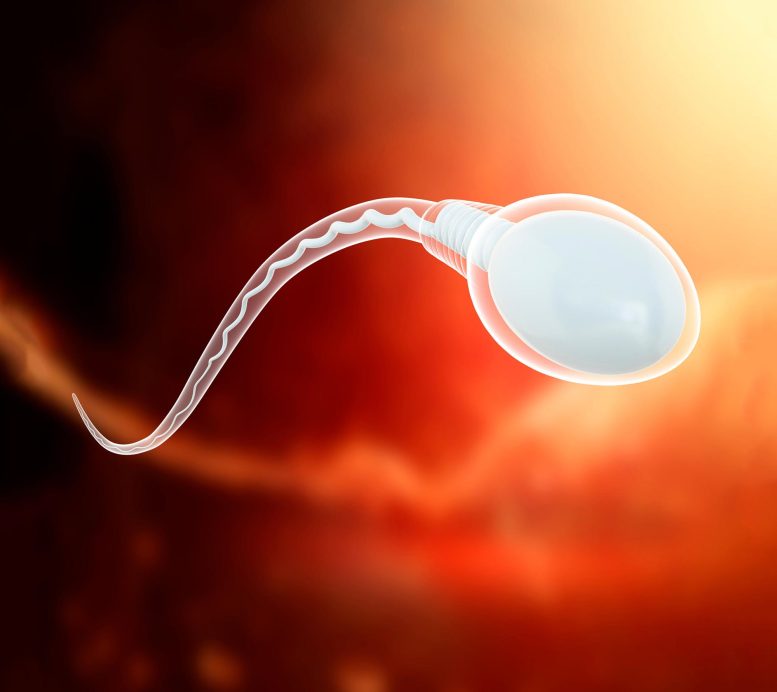
Dr. Wei Yan discovered a natural compound that exhibits almost ideal male contraceptive effects in pre-clinical studies.
In a paper published by Nature Communications, The Lundquist Institute (TLI) Investigator Wei Yan, MD, PhD, and his research colleagues spell out an innovative strategy that has led to the discovery of a natural compound as a safe, effective, and reversible male contraceptive agent in pre-clinical animal models. Despite tremendous efforts over the past decades, the progress in developing non-hormonal male contraceptives has been very limited.

Dr. Wei Yan, Investigator, The Lundquist Institute. Credit: The Lundquist Institute
The compound is triptonide, which can be either purified from a Chinese herb called Tripterygium Wilfordii Hook F, or produced through chemical synthesis. Single daily oral doses of triptonide induce altered sperm having minimal or no forward motility with close to 100% penetrance and consequently male infertility in 3-4 and 5-6 weeks. Once the treatment is stopped, the males become fertile again in ~4-6 weeks, and can produce healthy offspring. No discernable toxic effects were detected in either short- or long-term triptonide treatment. All of their data suggest that triptonide is a highly promising non-hormonal male contraceptive agent for men because it appears to meet all of the criteria for a viable contraceptive drug candidate, including bioavailability, efficacy, reversibility, and safety. A battery of biochemical analyses suggest that triptonide targets one of the last steps during sperm assembly, leading to the production of altered sperm without vigorous motility required for fertilization.
“Thanks to decades of basic research, which inspired us to develop the idea that a compound that targets a protein critical for the last several steps of sperm assembly would lead to the production of nonfunctional sperm without causing severe depletion of testicular cells,” said Dr. Yan. “We are very excited that the new idea worked and that this compound appears to be an ideal male contraceptive. Our results using non-injurious studies on lower primates suggest triptonide will be an effective treatment for human males as well. Hopefully, we will be able to start human clinical trials soon to make the non-hormonal male contraceptive a reality.”
“Dr. Yan’s discovery represents a major leap forward in the field,” said Drs. Christina Wang and Ronald Swerdloff, who are TLI co-Principal Investigators helping lead NIH-supported advanced clinical trials on hormone-based birth control approaches. “The more contraceptive methods available, the better, as we will want a family of pharmaceutical products to safely and effectively meet the family planning needs of men and couples at different stages of their reproductive lives, with differing ethnic, cultural, and religious backgrounds and economic means,” emphasized Wang and Swerdloff.
Reference: “Triptonide is a reversible non-hormonal male contraceptive agent in mice and non-human primates” by Zongliang Chang, Weibing Qin, Huili Zheng, Kathleen Schegg, Lu Han, Xiaohua Liu, Yue Wang, Zhuqing Wang, Hayden McSwiggin, Hongying Peng, Shuiqiao Yuan, Jiabao Wu, Yongxia Wang, Shenghui Zhu, Yanjia Jiang, Hua Nie, Yuan Tang, Yu Zhou, Michael J. M. Hitchcock, Yunge Tang and Wei Yan, 23 February 2021, Nature Communications.
DOI: 10.1038/s41467-021-21517-5
About The Lundquist Institute: Research with reach
The Lundquist Institute is an engine of innovation with a global reach and a 69-year reputation of improving and saving lives. With its new medical research building, its state-of-the-art incubator, “BioLabs at The Lundquist,” existing laboratory and support infrastructure, and the development of a new 15-acre business tech park, the Lundquist Institute serves as a hub for the Los Angeles area’s burgeoning biotech scene. The research institute has over 100 principal investigators (PhDs, MDs, and MD/PhDs) working on more than 600 research studies, including therapies for numerous, and often fatal orphan diseases.


0 Comments